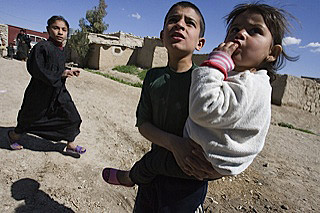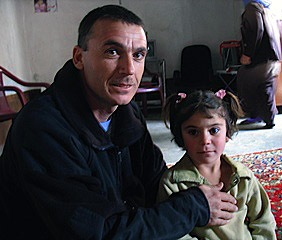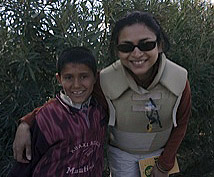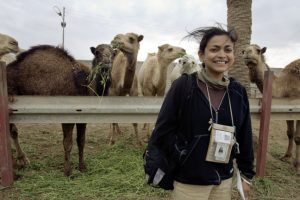
Who are the Yezedis, the 40,000 people who are hiding in the Sinjar Mountains from the horror of the Islamic State of Iraq and Syria militants?
They are not Muslims. They are a people largely forgotten by the world. In 2007, I had the opportunity to spend time in Nineveh province in the towns and villages around the Sinjar Mountains. Here is a blog post I wrote for the Atlanta Journal-Constitution on April 6:
Caesar, an interpreter for the U.S. Army, shuttles us into the courtyard of his house in Baronah, Iraq. He is anxious for Maj. Daniel Rice to see where he lives, meet his family.

Caesar (his real name has been withheld for safety reasons) is proud of who he is. “I am not Muslim, ” he says. “I am Yezedi.”
Rice, a border patrol transition team officer from Atlanta, sits on a white plastic chair and drinks a can of the local version of RC Cola. Today, he is the guest of honor.
The women of the family usher me into one of the rooms to show me the newborn of the family lying in a small crib. Caesar introduces me to his sisters. They are wearing slinky skirts and body-hugging blouses. Gold jewelry adorns their necks, ears and wrists.
The Yezedis are an obscure sect whose beliefs are ancient and whose practices are often misinterpreted.
No one knows exactly how many Yezedis are left in the world though it’s estimated that 100,000 live here in northwestern Iraq, along the Sinjar Mountains.
The Yezedis are an insular people who have their own customs. They never wear the color blue or eat lettuce.
They have kept their religion alive through oral history and have falsely come to be known as devil worshippers because they are followers of the fallen angel, Lucifer.
The Yezedis, however, believe Lucifer was forgiven by God and returned to heaven. They call him Malek Taus (the peacock king) and pray to him. They do not ever use the word “Satan.”
In the Yezedi villages, women don’t have to cover their heads. They consume alcohol. Cans of Heineken pile up on trash heaps. At a local new year’s festival, Georgia Army National Guard soldiers were offered whisky (they declined, of course).
The Yezedis, like their neighbors the Kurds, were persecuted by Saddam Hussein after he took power in 1979. When the dictator was toppled in 2003, the Yezedis had great hopes that their lives would take a turn for the better.
They believed in the Americans as saviors who would release them from their misery.

But now, in the fifth year of the war, frustration surfaces in Yezedi villages.
In nearby Yarmouk, the mukhtar (mayor), Qasim Sameer Rashu, sits down eagerly with Maj. Voris McBurnette, a high school principal from Raleigh, N.C., who is serving in Iraq on a military transition team.
Rashu leads McBurnette into a large hall lined with carpets on the floor and fancy lighting fixtures on the ceiling. There is, however, no electricity.
Rashu doesn’t hold back. He unleashes a torrent of complaints — no electricity, no water, no food supply.
“Electricity? We have forgotten what it is, ” Rashu says.
“In the beginning we were happy to see coalition forces. They got rid of Saddam. Now we are disappointed.”
McBurnette explains that coalition forces will do less from now on.
“It’s time for the Iraqi government to do more, ” he says.
“You are right, ” Rashu says. “But for three months, they have done nothing for us.”
He says insurgents often target trucks carrying food and medicine into the village.
“What if your kids were without food, without water, without power?, ” Rashu tells the major.
“We think the insurgents come from outside of Iraq but the Arabs here help them. And the Iraqi government — they are not hungry. They don’t know what’s going on in these villages far away from Baghdad.”
They are a forgotten people, Rashu says.
“We feel safer with Saddam gone but the services we have are worse.”
McBurnette explains that the Iraqi government must learn to respond to its own citizenry; that Americans can no longer do their job for them.
And then the mukhtar makes a politically-charged statement.
“We want to be part of Kurdistan.”
Though they practice a different religion, the Yezedis have much in common with the Kurds. They come from the same ethnic stock.
But because they occupy villages that sit on the borderlands between Arab Iraq and Kurdistan, the Yezedis were caught for years between the two.
The Kurds, who established an autonomous region after the 1991 Gulf War, now exercise influence in the Sinjar area but few Yezedis want to be co-opted by their northern neighbors. They have fought for centuries to maintain their identity. Rashu speaks out of economic desperation.
“In four years, the only help we have seen is from Kurdistan, ” he says.
Back in Baronah, Caesar’s family don’t want to let Rice and his team leave. They want him to experience Yezedi hospitality.
Caesar’s family, meanwhile, shows me albums containing snapshots of weddings and vacations. They like to go to Dohuk, a Kurdish city in northern Iraq, where “things are so nice.”
The Yezedis are far removed from the bustling streets of Baghdad. Overlooked even in a war that cruelly highlights ethnic and sectarian differences. There is no mention of them even by those who want to ethnically carve up Iraq into separate nations.
Sadly, one man tells me, the only connection to Iraq these days is through bloodshed. The Yezedis, he says, are prone to bombings and assasinations just as their Sahiite, Sunni and Christian brethren living south and east of them.
Caesar’s sister wants me to take home a photo from their family album. I tell her I cannot accept something so personal.
She tells me they have never seen a foreign journalist in their village before. She says she probably won’t again. She is part of a forgotten people.

